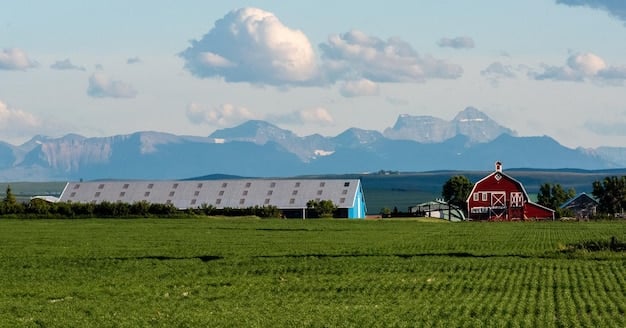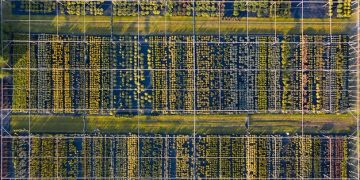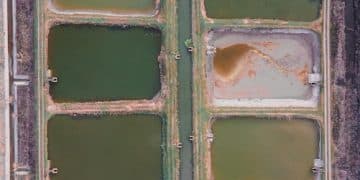Discover Financial Incentives for Sustainable Agriculture in 2025

Discover the financial incentives available for implementing sustainable agriculture practices in 2025, including federal programs, state initiatives, and private grants, designed to support farmers in adopting environmentally friendly and economically viable farming methods.
Embarking on sustainable agriculture can seem daunting, but discover the financial incentives available for implementing sustainable agriculture practices in 2025 and learn how they can transform your farm into an environmentally friendly and economically thriving enterprise.
Exploring Federal Programs Supporting Sustainable Agriculture
The U.S. government offers several federal programs designed to help farmers implement sustainable agriculture practices. These initiatives not only provide financial assistance but also promote environmental stewardship and long-term agricultural viability.
Natural Resources Conservation Service (NRCS)
The NRCS, a division of the USDA, provides technical and financial assistance to farmers through various programs. These programs are designed to address specific environmental concerns and promote sustainable farming methods.
Environmental Quality Incentives Program (EQIP)
EQIP offers financial and technical assistance to implement conservation practices. Through EQIP, farmers can receive funding for implementing a variety of conservation practices, such as cover cropping, conservation tillage, and nutrient management. These practices improve soil health, water quality, and overall farm sustainability.
- Financial assistance to cover the costs of implementing conservation practices.
- Technical support from NRCS experts to develop and implement conservation plans.
- Focus on addressing specific environmental concerns on the farm.
Conservation Stewardship Program (CSP)
CSP rewards farmers who actively maintain and improve existing conservation efforts. The program provides financial assistance for adopting additional conservation activities and enhancements, building on existing conservation efforts to achieve higher levels of environmental stewardship.

CSP emphasizes comprehensive conservation, encouraging farmers to integrate multiple conservation practices across their entire operation. This holistic approach ensures long-term sustainability and environmental benefits.
Federal programs like EQIP and CSP provide crucial support for farmers transitioning to or enhancing sustainable practices. By leveraging these resources, farmers can improve their environmental footprint while ensuring economic viability.
State-Level Initiatives: Grants and Tax Credits
Beyond federal programs, many states offer their own incentives to promote sustainable agriculture. These state-level initiatives often provide additional financial support and resources tailored to local agricultural needs and environmental priorities.
California’s Climate Smart Agriculture Programs
California has been proactive in addressing climate change through its Climate Smart Agriculture programs. These programs offer grants and incentives for implementing practices that reduce greenhouse gas emissions and enhance carbon sequestration in agricultural lands.
The programs provide funding for various practices, including:
- Cover Cropping: Planting cover crops to improve soil health and sequester carbon.
- Compost Application: Using compost to enhance soil fertility and reduce the need for synthetic fertilizers.
- Reduced Tillage: Minimizing soil disturbance to reduce carbon emissions and improve soil structure.
New York’s Environmental Tax Credits
New York offers environmental tax credits for farmers who implement certain conservation practices. These tax credits can help offset the costs of adopting sustainable farming methods, making it more financially feasible for farmers to invest in environmental stewardship.
These initiatives are specifically designed to encourage farmers to adopt practices that benefit the environment and enhance the long-term sustainability of their operations.

State-level initiatives, like those in California and New York, demonstrate the commitment of individual states to supporting sustainable agriculture through targeted financial incentives. By combining state and federal resources, farmers can access a wide range of support for adopting sustainable practices.
Private Grants and Foundations Supporting Sustainable Farms
In addition to government programs, private grants and foundations play a significant role in supporting sustainable agriculture. These organizations often provide funding for innovative projects, research initiatives, and educational programs that advance sustainable farming practices.
Sustainable Agriculture Research & Education (SARE)
SARE, while funded by USDA, operates as a grassroots, farmer-driven program that provides grants for research and education projects focused on sustainable agriculture. SARE grants support farmers, researchers, and educators in developing and disseminating sustainable farming practices.
SARE offers various grant opportunities, including:
- Farmer/Rancher Grants: Funding for farmers and ranchers to conduct on-farm research and demonstration projects.
- Research and Education Grants: Support for researchers and educators to develop and disseminate sustainable agriculture knowledge.
- Professional Development Program Grants: Funding for agricultural professionals to enhance their knowledge and skills in sustainable agriculture.
The Ceres Trust
The Ceres Trust focuses on supporting organizations and initiatives that promote regenerative agriculture and sustainable food systems. The foundation provides grants for projects that address soil health, biodiversity, and climate change mitigation in agriculture.
By supporting innovative projects and collaborative efforts, private grants and foundations help drive the adoption of sustainable agriculture practices and promote a more resilient and environmentally friendly food system.
Private grants and foundations are essential partners in advancing sustainable agriculture, providing critical funding and support for innovative projects and research initiatives and educational programs.
Navigating the Application Process for Financial Incentives
Securing financial incentives for sustainable agriculture requires careful planning and diligent application. Understanding the application process, meeting eligibility requirements, and preparing a strong proposal are essential for success.
Researching Available Programs
The first step in the application process is to research available programs at the federal, state, and local levels. Use online resources, such as the USDA website, state agriculture department websites, and directories of private grants, to identify funding opportunities that align with your farm’s goals and needs.
Meeting Eligibility Requirements
Each financial incentive program has specific eligibility requirements that applicants must meet. Review the program guidelines carefully to ensure that you qualify for the funding. Common eligibility requirements may include farm size, conservation practices implemented, environmental impacts addressed, and financial need.
Ensuring you meet all eligibility criteria is crucial for a successful application.
- Carefully reviewing program guidelines.
- Verifying your farm’s eligibility.
- Gathering necessary documentation of the proposed project.
Preparing a Strong Proposal
Submitting a strong and well-articulated proposal is essential for securing funding. Your proposal should clearly outline the goals of your project, the conservation practices you plan to implement, the expected environmental benefits, and the financial impact on your farm.
Navigating the application process for financial incentives requires thorough research, attention to detail, and a well-prepared proposal. By taking the time to understand the requirements and present a compelling case for your project, you can increase your chances of securing funding and advancing sustainable agriculture on your farm.
Case Studies: Successful Implementation of Sustainable Practices with Incentives
Real-world examples demonstrate the positive impact of financial incentives on the adoption of sustainable agriculture practices. These case studies highlight how farmers have successfully leveraged funding to improve their environmental performance and economic viability.
Cover Cropping Success in the Midwest
A corn and soybean farmer in Iowa used EQIP funding to implement a comprehensive cover cropping system on their farm. The farmer planted a mix of cover crops, including cereal rye, oats, and radishes, after harvesting their cash crops each fall. The cover crops improved soil health, reduced erosion, and suppressed weeds.
This integration had the following visible results:
- Improved soil organic matter content.
- Reduced need for synthetic herbicides.
- Increased crop yields over time.
Rotational Grazing in the Southeast
A cattle rancher in Georgia used CSP funding to implement a rotational grazing system on their pasturelands. The rancher divided their pastures into multiple paddocks and rotated their cattle among the paddocks on a regular basis. This practice improved forage utilization, reduced overgrazing, and enhanced soil health.
These case studies demonstrate the tangible benefits of using financial incentives to implement sustainable agriculture practices. By learning from these examples, farmers can gain insights and inspiration for improving their own operations and contributing to a more sustainable food system.
Looking Ahead: The Future of Sustainable Agriculture Incentives in 2025
The landscape of sustainable agriculture incentives is constantly evolving, with new programs and funding opportunities emerging each year. Staying informed about the latest developments and trends is essential for farmers seeking to access financial support for their sustainable farming efforts.
Anticipated Policy Changes
Several potential policy changes could impact the availability and structure of sustainable agriculture incentives in 2025. These include updates to federal farm bill programs, new state-level initiatives, and changes to private grant programs.
Emerging Funding Opportunities
New funding opportunities are also likely to emerge in 2025 as governments, private foundations, and investors increasingly recognize the importance of sustainable agriculture. These may include grants for innovative technologies, investments in regenerative agriculture practices, and support for local food systems.
By staying informed, farmers can position themselves to take advantage of emerging opportunities and contribute to a more sustainable and resilient agricultural sector in the years to come.
| Key Point | Brief Description |
|---|---|
| 🌱 Federal Programs | EQIP and CSP offer financial & technical aid. |
| 💰 State Initiatives | Grants & tax credits in CA & NY for eco-friendly practices. |
| 🤝 Private Grants | SARE & Ceres Trust support sustainable agriculture research. |
| 📝 Application Process | Research programs, meet criteria, prepare a solid proposal. |
Frequently Asked Questions
▼
Sustainable agriculture involves farming practices that are environmentally sound, economically viable, and socially responsible. It focuses on preserving natural resources and minimizing environmental impacts.
▼
Examples include cover cropping, crop rotation, conservation tillage, integrated pest management, and water conservation techniques. These practices improve soil health and biodiversity.
▼
Check the USDA and NRCS websites for detailed information on programs like EQIP and CSP. These sites offer guidelines, application details, and eligibility requirements.
▼
Yes, many programs prioritize support for organic farming practices. The Organic Initiative under EQIP, for example, offers tailored assistance for certified organic and transitioning producers.
▼
Private grants and foundations often fund innovative research and education projects. They can provide crucial initial funding and support for implementing sustainable practices.
Conclusion
Discover the financial incentives available for implementing sustainable agriculture practices in 2025 that can play a crucial role in promoting environmentally responsible and economically viable farming. By tapping into federal, state, and private programs, farmers can take bold steps towards a more sustainable future, ensuring a healthier planet for future generations.





